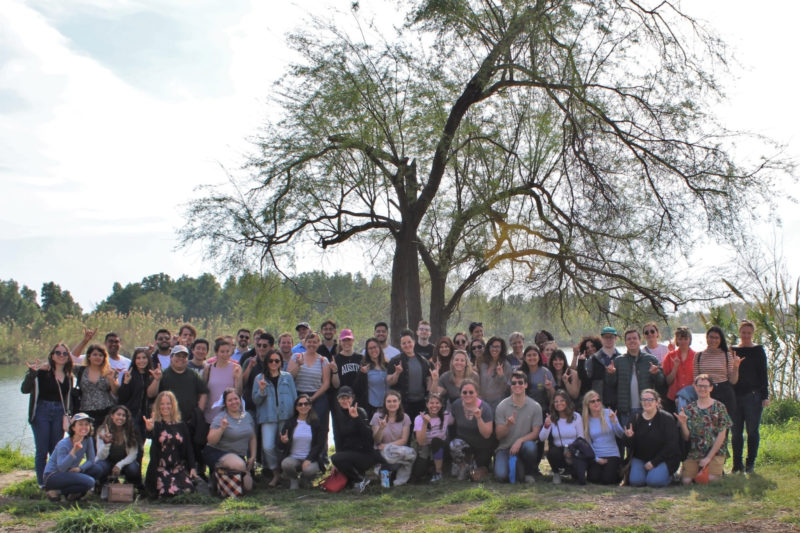UT’s William Wayne Justice Center Encourages Students to Enter Public Interest Law
By Hailin Zhang
Reporting Texas
 Jane, one of millions of Texans living below the poverty level, needs a lawyer but cannot afford to pay for one. Fortunately, she’s part of the approximately 5.2 million who qualify for legal aid. So she has a couple of options.
Jane, one of millions of Texans living below the poverty level, needs a lawyer but cannot afford to pay for one. Fortunately, she’s part of the approximately 5.2 million who qualify for legal aid. So she has a couple of options.
She could get help from an organization like Texas RioGrande Legal Aid, which serves Central Texas, or contact Volunteer Legal Services of Central Texas, which provides civil legal services to low-income clients through pro bono attorneys.
Representing herself in court is a last resort, since this puts her at a disadvantage. However, when demand for attorneys exceeds supply—which is often the case—it may be necessary.
Jane is not real. The 5.2 million Texans are.
With roughly one attorney per every 7,000 Texans who qualify, less than 10% of their civil legal needs are currently being met.
This demonstrates the importance of public interest law.
Public interest lawyers use their legal expertise to fight “on behalf of marginalized clients who otherwise have little hope of getting a fighting chance in our legal system,” according to Russell Engler, professor and director of clinical programs at New England Law.
Public interest law isn’t limited to any one field or set of fields; rather, the determining factors are the practice setting and type of client. Typically, public interest lawyers represent those who are very poor and cannot pay for legal representation.
“The lawyer works for a legal aid or nonprofit organization that is funded by government grants, donations or a combination of the two,” said Mary Crouter, clinical professor and assistant director of the William Wayne Justice Center for Public Interest Law at the University of Texas School of Law.
Consequently, these attorneys’ salaries are not high. Research from the National Association for Law Placement indicates slow growth since 2004.
“Those providing civil legal services have the lowest median entry-level salary [and] earn the smallest increases in salary based on experiences,” according to the July 2018 report.
Thus, encouraging students to pursue careers in the public interest domain is a big part of the Justice Center’s mission.
“We provide programming and advising that helps students navigate the field,” Crouter said. “The Justice Center’s pro bono program helps students explore public interest law and develop relevant skills.”
The center provides partial and full tuition scholarships—so those who plan to become public interest lawyers can enter the profession without worrying about student loan debt—and summer and postgraduate fellowships, helping launch juris doctors into public interest positions.
This academic year, first-year law student Araceli Garcia was the recipient of the Equal Justice Scholarship, which is awarded to a student with strong academic credentials, a demonstrated commitment to public service and specific intent to serve low-income individuals following graduation.
“The scholar commits to working on a full-time basis for three years, providing direct legal services to low-income groups at a public defender office or nonprofit organization,” Crouter said.
For Garcia, this is easy.
She plans to dedicate her entire life to assisting low-income cohorts.
“I would like to have tangible impact on the lives of community members,” Garcia said. “Having access to quality legal help isn’t a reality for so many people—people who arguably, I think, need it most.”
Garcia maintains that our legal system is severely unjust, disproportionately affecting people of color and low-income persons.
“As a woman of color from a low-income background, these issues are personal,” Garcia said. “When I work with clients of color, immigrant clients or clients dealing with substance abuse issues, I see the experiences of my own family members and community reflected. While this can make doing this work even more emotionally draining, it also means that the level of care, empathy and lived experiences I bring often makes it easier for clients to build trust, feel heard and less alone in their situations.”
Few people are aware of the power of state legislators and the influence they have, especially here in Texas, Garcia said.
“We saw that in this last legislative session with Senate Bill 8, the six-week abortion ban,” Garcia said. “We saw that with the classroom censorship bills, we that with the bills that continue resurfacing—anti-trans bills and not allowing students to play on sports teams that align with their gender identity. All of these things you need lawyering for: litigating, advocating and advising nonprofits on what the impacts are and advising people who will be affected on what their rights are.”
Public interest lawyers work to address inequality through advocacy and impact litigation.
Nonprofits, like the Center for Reproductive Rights, are challenging SB 8 in court. Other organizations, like the American Civil Liberties Union, better known as the ACLU, handle impact litigation, which involves “planning, preparing and filing or defending lawsuits focused on changing laws or on the rights of groups of people,” according to Harvard Law School.
“We live in a world of stark inequalities,” Crouter said. “This has always been the case, but I think that now, as a country, we are waking up to this truth. I am extremely impressed by our students’ passion for social justice and the energy and creativity that they bring to it. I have faith that their generation will make significant progress toward a society that is more equitable and just.”
At a time when tensions are high and systemic injustices in our legal system are particularly visible, Garcia says her goal is to reimagine what justice can look like for Jane and those like her from low-income and racially marginalized communities and help them live dignified lives.